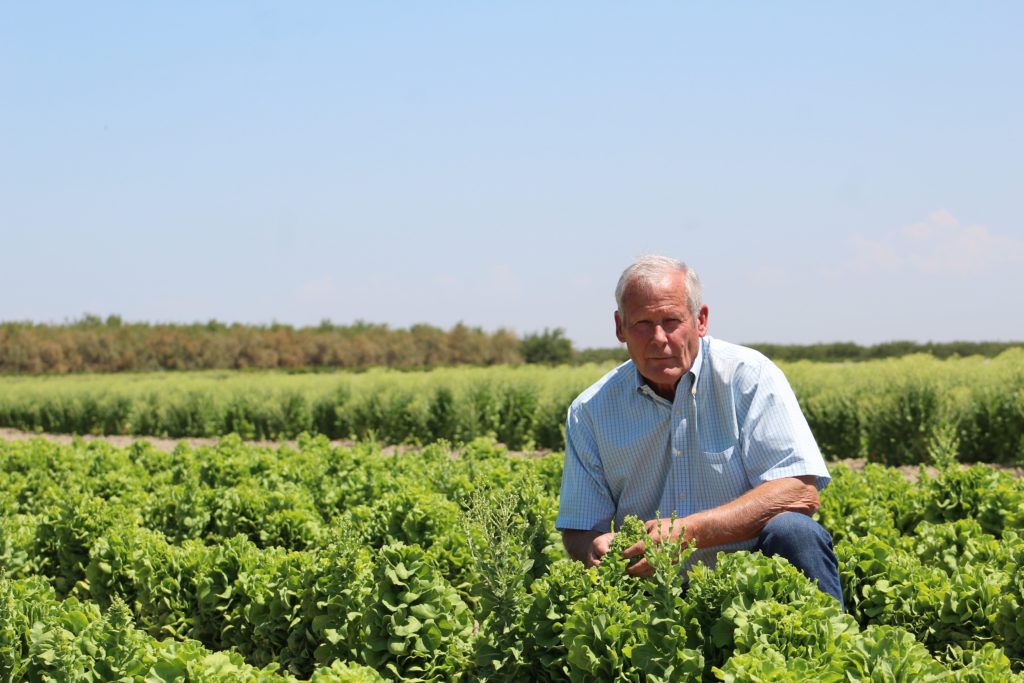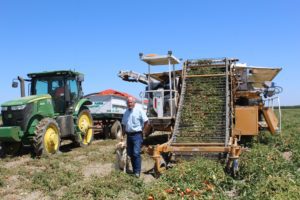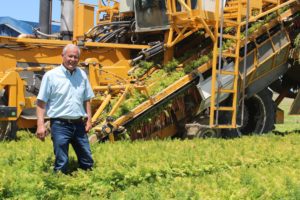
Oct 1, 2022Sustainability key to Terranova’s success
At Terranova Ranch, sustainability and concern for the environment fuel efficient growth of numerous vegetables, winegrapes and nuts. The San Joaquin Valley operation of 9,000 acres, in Helm, California, employs technology and new growing practices to conserve water and power to sustainably grow crops.
Healthy soil and sustainable growing practices, including groundwater recharge, whole orchard recycling and native pollinator hedgerows, are important for the farm managed by Don Cameron, vice president and general manager, a half hour southwest of Fresno, California.

Terranova grows more than 25 crops, mostly on contracted acreage, and performs custom farming for other growers. Most crops are grown for seed and include fresh and processed onions and garlic, fresh carrots, broccoli for seed, processing tomatoes and cabbage, winegrapes and nuts, including almonds, pistachios and walnuts.
The company began farming in 1979. Cameron joined in 1981 as vineyard manager. Six years later, he took over management.
Exiting the commodity trap
In the early 2000s, Terranova changed its philosophy, leaving commodity crops such as cotton, alfalfa hay, wheat and barley. In the path to specialty crops, the company wanted to leave commodities that require price support, which don’t react to market changes.
“We made a conscious change that we wanted to be more diverse,” Cameron said. “We wanted to get into higher value crops. We really pursued going down different avenues.”
Contracting added more stability and helped Terranova’s long-term success. It considers crops other growers may overlook.
“New crops for us are critical,” Cameron said. “Being flexible and looking for other crops, it’s about change, which is difficult for many people to embrace. Sometimes, we get into thinking how we know how to grow this crop, so we don’t want to take on new challenges. We embraced the challenge of change and do the best we can to make it work.”
Crops are rotated with various crops, including Sudan grass. Since 2018, Terranova has been growing organic corn as a rotational crop for feed for a local poultry producer. In the regenerative system, Terranova applies chicken manure or compost as a fertilizer, which also benefits tomato crops. The manure fortifies depleted soil with nutrients and organic matter.
“Originally highly alkaline and tough ground, this enriching of the soil with nutrients from the chicken manure along with gypsum and soil sulfur has really turned our ranch around to where we can grow almost any crop we want and is extremely productive now,” Cameron said.
Soil health
The reclaimed ground provides many benefits and fewer issues than in the past.
“Soil health is critical,” Cameron said. “There are lots of benefits to the soils. The other crops we rotate tend to be more productive and higher quality. Our plants will be more resilient to drought. We have seen real long-term benefits.”
In 1993, Terranova began farming organically on 15 acres. Today, 10%, or 900 acres, are organic. “What we learned in organic production we transferred to conventional,” Cameron said. “We use the same criteria. Our soils are really healthy.”

In August, Terranova added a laser weeder which selectively kills weeds from the front of the tractor mount. While the equipment is not inexpensive, Cameron believes the benefits outweigh the costs, particularly with how much a grower spends on hand weeding.
“Hopefully, the potential in this technology will get better as it gets more into the field and improve the programs that run it, visually identifying weeds and not onions, carrots or tomatoes, not touching the crops we have,” Cameron said.
While automated irrigation limits water use on permanent plantings, Terranova found difficulty applying it to short-term field crops. Wells are monitored via smart data usage, including energy use and the costs and volume of pumping. Employees use tablets to view aerial images to check on water stress and plant growth.
Water, energy conservation
Decades ago, Terranova developed a system to recapture flood water for crops, maintaining aquifer levels, important when California growers are seeing more water restrictions.
Pollinator hedgerows planted along canals prevent erosion. Native pollinators, including hummingbirds, are beneficial to seed crops and almonds and attract habitat, including milkweed, which invite monarch butterflies.
Owl boxes on the property bring predators of gophers, which destroy drip tape. Terranova began using drip tape on tomatoes in 1991 after being told it couldn’t grow tomatoes on sandy ground. Today, it grows 2,200 acres. Initially, the drip tape increased yields from 42 tons per acre to 60 tons, reducing water consumption by 25%. Now drip tape waters all crops.
Variable speed motors allow energy conservation by matching water needs. Terranova recently transitioned from gasoline powered ATV quads to cordless John Deere Gators. The company also transitioned tractors, forklifts and backhoes to lower-emission equipment.
To combat escalating labor costs, Terranova is mechanizing as many operations as possible. Cameron is looking to provide better jobs for the next generation of farmworkers.
“We think there’s a whole new world being able to run this technology on the farm,” he said. “We will be able to provide the training and positions we haven’t seen in the past, a real opportunity for students to get involved and provide a pathway to make a living.”
Cameron remains optimistic.
“For the most part, farming is an enjoyable life,” he said. “Harvest time is always a satisfying time. It’s good to see the crop growing throughout the year and know it’s critical to feeding the world, knowing you’re an integral part of the system that people rely on. There’s a lot of stress and hardship you face, but I don’t think I’d want to do anything other than this.”
— Doug Ohlemeier, assistant editor
Top photo: Terranova Ranch’s Don Cameron in a field of lettuce grown for seed production. PHOTOS: Lindsay DaFonte
Middle photo: Don Cameron and his golden retriever Lily during harvest of Roma tomatoes for processing for paste.
Bottom photo: Don Cameron of Terranova Ranch in a field of carrots being harvested.
















